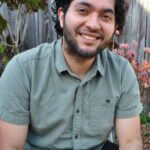
Jomar Rodriguez Ventura
Jomar (he/him) is a Latine transplant from South El Monte, Kizh and Tongva territories, to the San Francisco Bay Area, where he lives and grows both gardens and community near the San Francisco Bay Estuary in unceded territories of Chochenyo-speaking Ohlone Peoples. He currently serves as environmental justice educator and climate resilient communities coordinator for Mycelium Youth Network and is currently a graduate student in the Master of Science Resilient and Sustainable Communities program at Prescott College. Jomar aims to graft environmental justice (EJ) education, climate communication, BIPOC-led community organizing, and frontline climate resilience through adaptation and mitigation strategies across multiple systems from food sovereignty to land-use policy. A background in psychology and social welfare informs his frameworks and approaches to the human-work central to community-level systems changes that will ultimately promote physical, psychological, and spiritual benefits with regards to environmental protective factors and resultant indicators of health. Jomar believes that young people’s quality of education, food, health, and general well-being should be held as center-piece for all conversations around climate resilience precisely because they are the most marginalized individuals while also the biggest stakeholders in a climate-challenged future. For these reasons, Jomar’s broad goal includes raising youth critical consciousness and enabling youth climate justice leaders. Mycelium Youth Network’s Youth Leadership Council, CAPECA, and various other partnerships continue to develop his capacity to foster youth leaders. Jomar hopes to engage students and teachers abroad as community-based climate justice leaders through the Ten Strands curriculum as we incorporate MYN elements into the climate justice curricula for ninth and tenth grade across California. Ultimately, Jomar’s vision for EJ and climate resilience is to shift the conversation from solely focusing on solutions for the climate crisis and instead dialogue about fertile possibilities for social-ecological justice in a climate-challenged future.
Jomar (he/him) is a Latine transplant from South El Monte, Kizh and Tongva territories, to the San Francisco Bay Area, where he lives and grows both gardens and community near the San Francisco Bay Estuary in unceded territories of Chochenyo-speaking Ohlone Peoples. He currently serves as environmental justice educator and climate resilient communities coordinator for Mycelium Youth Network and is currently a graduate student in the Master of Science Resilient and Sustainable Communities program at Prescott College. Jomar aims to graft environmental justice (EJ) education, climate communication, BIPOC-led community organizing, and frontline climate resilience through adaptation and mitigation strategies across multiple systems from food sovereignty to land-use policy. A background in psychology and social welfare informs his frameworks and approaches to the human-work central to community-level systems changes that will ultimately promote physical, psychological, and spiritual benefits with regards to environmental protective factors and resultant indicators of health. Jomar believes that young people’s quality of education, food, health, and general well-being should be held as center-piece for all conversations around climate resilience precisely because they are the most marginalized individuals while also the biggest stakeholders in a climate-challenged future. For these reasons, Jomar’s broad goal includes raising youth critical consciousness and enabling youth climate justice leaders. Mycelium Youth Network’s Youth Leadership Council, CAPECA, and various other partnerships continue to develop his capacity to foster youth leaders. Jomar hopes to engage students and teachers abroad as community-based climate justice leaders through the Ten Strands curriculum as we incorporate MYN elements into the climate justice curricula for ninth and tenth grade across California. Ultimately, Jomar’s vision for EJ and climate resilience is to shift the conversation from solely focusing on solutions for the climate crisis and instead dialogue about fertile possibilities for social-ecological justice in a climate-challenged future.
